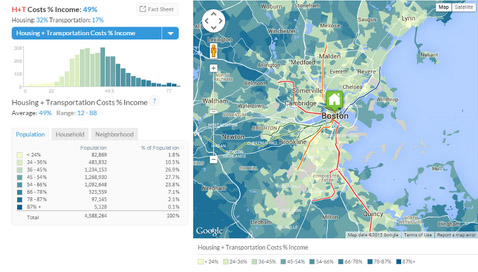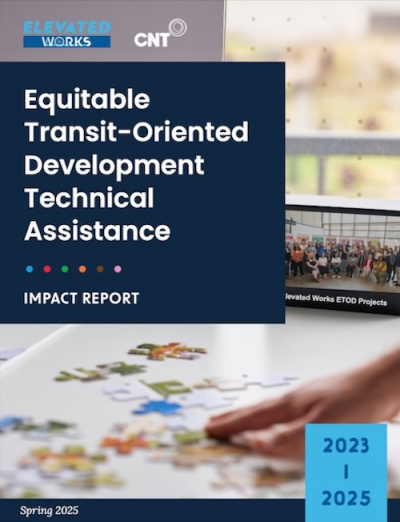
Celebration Highlights CNT Innovations
A big thank you to all the friends, donors, sponsors and partners who attended the Sustain-a-City Celebration on September 28th, CNT’s biggest event of the year. The Celebration highlighted CNT’s work, and raised nearly $100,000 for our efforts to help cities operate more sustainably and efficiently. Featured at the Celebration was CNT’s Urban Sustainability Tech Challenge, a five-month program that unlocks talent in our communities to connect entrepreneurs and community members to each... Read the rest of this entry »
Rapid Prototyping in the Public Interest
By Adam Hecktman, Microsoft You don’t have to be a technology expert, or even more than a casual observer of technology, to know that data is everywhere, impacting every field, every industry, and just about every aspect of life. The recent advances in cloud computing power and the proliferation of sensor technology have incredible potential to help humans in terms of what they are capable of. With the acceleration of the collection, storage, and analysis of data at unprecedented scale,... Read the rest of this entry »
The Problem of Industrial Succession Space
The Chicago economy is continually launching new companies. Some spin off from older firms; others are start-ups nurtured by business incubators. One notable incubator is the Industrial Council of Nearwest Chicago (ICNC), which has incubated thousands of new companies. Founded in 1967 ICNC is home to over 110 small companies at a time which are supported to grow, and then outgrow their ICNC space. ICNC is also launching The Hatchery, an incubator focused on food start-ups. The Hatchery will... Read the rest of this entry »
Industrial EcoDistricts Present Major Opportunity as Manufacturing Returns to Urban Communities
There are over 950,000 more manufacturing jobs in the U.S. today than in 2010. This resurgence presents a major opportunity for communities. As a segment of manufacturers turns away from the inefficiencies of sprawling suburban industrial parks and re-onshores production from overseas locations there is growing demand for urban locations. But cities that want to take advantage of manufacturing’s return need to be fully prepared. An EcoDistrict approach to industrial revitalization can help keep... Read the rest of this entry »
Withdrawing from Paris Agreement a Mistake
President Trump’s recent announcement that the U.S. will withdraw from the Paris Agreement on climate change was a disappointing step backward for the nation on one of the greatest global challenges of our era. The impacts of climate change are already happening today—we are seeing flooding communities, droughts, and an increasing frequency of so-called “100 year storms.” Turning a blind eye in the hopes of resurrecting an antiquated, outdated carbon-based economy is not going to make the... Read the rest of this entry »
It's Time to Rethink That Infrastructure Question
It will cost about $4.6 trillion to bring U.S. infrastructure to a state of good repair, according to the American Society of Civil Engineers Infrastructure Report Card released last week. If by some miracle our civic leadership raised all that money and hired the engineering and construction firms to do the work, we'd end up with thousands of examples of state-of-the-art 1950s investments. Let's not do that. Instead, let's acknowledge the costs of outdated approaches that wasted... Read the rest of this entry »
Cubs Win! CNT's Urban Analytics Team Wins Too!
Some of you will recall that when I took over as CEO of the Center for Neighborhood Technology this Fall, I noted that our team was expecting a Cubs World Series victory this year. Now that we’ve achieved that historic goal in Chicago, reaching our other organizational strategic goals are taking center-stage. We feel inspired by what this city can accomplish, when we put our hearts and minds to something. At CNT, our mission for 38 years has been to ensure urban economic development... Read the rest of this entry »
New economic development framework shows how cities can reduce poverty by 25 percent with smarter investments
CNT is excited to release our Urban Opportunity Agenda today. This new framework for economic development turns the traditional job creation model on its head, generating economic growth from the ground up by systemically reducing the cost of living and doing business in a place. In communities across the country, high poverty rates, stagnant wages, and the rising cost of living are dragging down local economies. In contrast, new efficiencies and targeted investments can provide a win-win,... Read the rest of this entry »
New Tool Helps California Developers Make Smarter Development Decisions
California communities now have a tool to help them design and site buildings that promote less driving, lower greenhouse gas emissions, and greater affordability. GreenTRIP Connect, conceptualized by TransForm and developed by CNT, quantifies how much space and resources can be saved by using GreenTRIP strategies like building near transit, right-sized parking, transit passes, and access to car and bike share. GreenTRIP Connect lets users enter the location of a... Read the rest of this entry »
The Rich Shouldn’t Be the Only Ones Who Get to Live Near Transit
Equitable transit-oriented development (eTOD) seems like a no-brainer for many Chicagoans. Housing and amenities near transit are, after all, community assets. Residents can get to work faster, with less stress, and they’re able to go about their daily business without having to bear the expenses of auto ownership. However, across Chicago, these benefits are not shared equally. Investment in TOD areas (and beyond, for that matter) is uneven. Some neighborhoods don’t have any new investment... Read the rest of this entry »





 Strengthening Transit Through Community Partnerships
Strengthening Transit Through Community Partnerships







